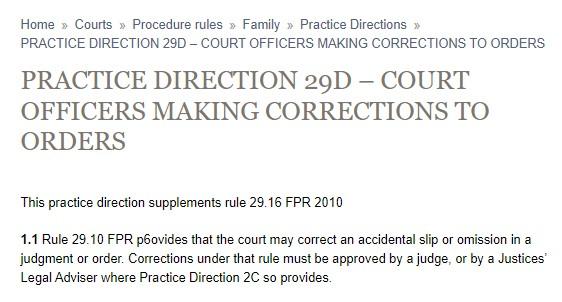The Slip Rule is a legal tool in England and Wales that allows judges to correct typographical or other errors in court orders or judgments.
The Slip Rule is included in both the Family Procedure Rules and the Civil Procedure Rules. This article will provide an overview of the Slip Rule, its application in Family and Civil cases, and the relevant rules and practice directions.
Errors may be caused by incompetence, typographical errors, clerical errors, or accidental slips or omissions. The Slip Rule is a common law principle that allows judges to make minor changes to their own orders, judgments, or directions to ensure that they accurately reflect the intention of the court.
The Slip Rule in Family Law Cases
The Family Procedure Rules (FPR) were introduced in 2010 and apply to family law cases in England and Wales. The FPR govern the procedure for family law cases, including divorce, child custody, and financial settlements. Family Procedure Rule 29.16 sets out the Slip Rule in family law cases.
Family Procedure Rule 29.16 states :-
(1) The court may at any time correct an accidental slip or omission in a judgment or order.
(2) A party may apply for a correction without notice.
Correction of errors in judgments and orders FPR 29.16
In addition to the Family Procedure Rule, there is also a Family Practice Direction that provide guidance on the use of the Slip Rule.
Family Practice Direction 29D provides guidance on the use of the Slip Rule in family law cases.
Note the careless typo by the Ministry of Justice in PD29D para 1.1 p6ovides. I would imagine this should be provides. Slip up or more evidence of incompetence at the MoJ ?

1.1 Rule 29.10 FPR p6ovides that the court may correct an accidental slip or omission in a judgment or order. Corrections under that rule must be approved by a judge, or by a Justices’ Legal Adviser where Practice Direction 2C so provides.
1.2 A court officer may make an amendment to an order, without prior reference to a judge or Justices’ Legal Adviser (as applicable), in the following circumstances-
(a) where a court officer has wrongly transposed details in the draft order approved by the court;
(b) where the error is obviously typographical such as-
(i) the spelling of a party’s name, a date of birth, a place of birth or marriage, where that can be corrected by reference to the application or supporting evidence on the court file such as a birth or marriage certificate; or
(ii) a nonsensical word clearly included in error (but see paragraph 1.4);
(c) changes to references in the order to the venue at which a hearing took place, where this can be verified from the court file, court diary or cause list;
(d) the date of the order, where this can be verified from the court file, court diary or cause list;
(e) details of a party’s legal representatives at a hearing when this can be verified from the court file or other record of hearing;
(f) the date of a hearing, where the court officer has listed a matter for hearing but transposed the details incorrectly into the order that notifies the parties of the hearing date;
(g) to improve the formatting (but not the numbering) of an order.
1.3 If a court officer concludes that-
(a) it would be inappropriate to make an amendment to an order even where they consider that a case falls within paragraph 1.2; or
(b) they are not certain whether or not a case falls within paragraph 1.2 (for example whether an error is obviously typographical),
the court officer must refer the matter to a judge to determine whether to make the amendment.
1.4 Save as specified in paragraph 1.2, a court officer must never make linguistic, grammatical or textual amendments to an order, or alter its numbering, without reference to a judge or, where Practice Direction 2C applies, to a Justices’ Legal Adviser.
1.5 A court officer must never make an amendment to a judgment or written ruling without reference to a judge or, where Practice Direction 2C applies, to a Justices’ Legal Adviser.
FAMILY PRACTICE DIRECTION 29D – COURT OFFICERS MAKING CORRECTIONS TO ORDERS
The Slip Rule in Civil Law Cases
The Civil Procedure Rules (CPR) were introduced in 1998 and apply to civil law cases in England and Wales. The CPR govern the procedure for civil law cases, including personal injury claims, contract disputes, and defamation claims. Civil Procedure Rule 40.12 sets out the Slip Rule in civil law cases.
Civil Procedure Rule 40.12 of the CPR states :-
(1) The court may at any time correct an accidental slip or omission in a judgment or order.
(2) A party may apply for a correction without notice.
Correction of errors in judgments and orders CPR 40.12
In addition to the Civil Procedure Rule, there is also a Practice Direction that provide guidance on the use of the Slip Rule.
Civil Practice Direction 40B provides guidance on the use of the Slip Rule in civil law cases.
4.1 Where a judgment or order contains an accidental slip or omission a party may apply for it to be corrected8.
4.2 The application notice (which may be an informal document such as a letter) should describe the error and set out the correction required. An application may be dealt with without a hearing:
(1) where the applicant so requests,
(2) with the consent of the parties, or
(3) where the court does not consider that a hearing would be appropriate.
4.3 The judge may deal with the application without notice if the slip or omission is obvious or may direct notice of the application to be given to the other party or parties.
4.4 If the application is opposed it should, if practicable, be listed for hearing before the judge who gave the judgment or made the order.
4.5 The court has an inherent power to vary its own orders to make the meaning and intention of the court clear.
CIVIL PRACTICE DIRECTION 40B – JUDGMENTS AND ORDERS
Conclusion
The Slip Rule is a legal tool in England and Wales that allows judges to correct typographical or other errors in court orders or judgments. The Slip Rule is included in both the Family Procedure Rules and the Civil Procedure Rules, and there are also Practice Directions that provide guidance on its use.
While the Slip Rule can be used to correct minor errors, it cannot be used to change the substance of a court order or judgment.
Check out our article on the highly questionable Sussex Family Justice Board and make up your own mind.
We recommend you should always seek formal legal advice if required, from a qualified and reputable lawyer (solicitor or barrister).
Our Family Solicitor and Family Barristers pages contains tips on how to find a competent lawyer.
We have a number of links to Free Legal Resources and Legal Organisations on our Free Legal Advice , Legal Aid and Pro Bono pages.
Read the reviews of Gavin Howe Barrister
“He is awful, underhanded and should not be practising law!”
Latest Articles
- What is a Paralegal ?A paralegal is a legal professional who performs tasks that require knowledge of legal concepts but does not hold the… Read more: What is a Paralegal ?
- What is a Judgment ?A judgment, also known as a judicial decision or court ruling, is the final decision made by a court of… Read more: What is a Judgment ?
- What is an Adverse Inference ?Adverse inference is a legal principle that plays a significant role in various areas of law, including criminal, civil, and family law. It arises… Read more: What is an Adverse Inference ?
- BarristersA barrister is anyone who has been Called to the Bar in England and Wales. For a barrister to offer… Read more: Barristers




